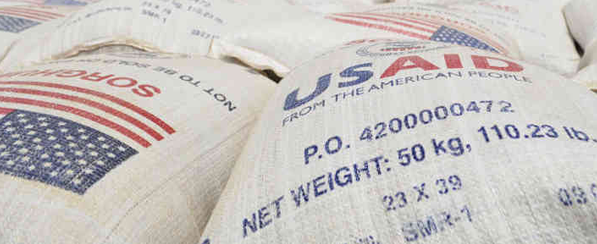
USA Maritime, a coalition of ship owning companies, maritime labor organizations & maritime trade associations states its position.
USA Maritime Chairman James L. Henry corrects reports about the efficacy of the U.S. Merchant Marine in delivering U.S. food aid and to comment on the detrimental effects of proposed changes to the Food for Peace Program (PL 480) offered in the Administration’s Fiscal Year 2014 budget. Excerpts from his statement are as follows:
“The United States is the largest provider of nutrition to the hungry and undernourished, contributing about 60 percent of the world’s food aid. Humanitarian assistance is a pillar of American foreign policy dating back to 1812 when President Madison sent emergency aid to South American earthquake victims and carried forward over the past sixty years as the Food for Peace Program.
“This successful program is now threatened by overwrought political efforts to provide cash donations rather than American grown and delivered food, changing longstanding assistance into a payment scheme that places the world’s most vulnerable populations at risk.
“Food for Peace has had the support of farmers, international relief and development organizations, ports, and inland and ocean transporters. This support ensures the success of the program and forms the basis of a resilient government policy. When commodities turn to cash, support is lost. Europe replaced its food delivery with a similar cash handout program only to see its contribution of food assistance drop by 40 percent. With the many complex and nuanced U.S. foreign policy interests, now is the wrong time to dismantle an effective tool of American diplomacy.
“So-called food aid reformers point to U.S. ocean carriers as the primary example of wasteful spending in the current program, but they do so without regard to the facts. Claims that U.S. ocean carriers have a captive customer and inexplicably raise prices for food aid delivery are false. Besides, program regulations limit carriers to Government-defined fair and reasonable rates.
Chairman James L. Henry concluded his remarks: “Despite calls to continue the Food for Peace Program, food aid reformers have twisted the truth about U.S. ocean shipping, forgotten our history, and neglected economic effects at home. Changing the food aid system will weaken the U.S. Merchant Marine, our national security and diplomatic effectiveness, and it will undermine the supply chain that delivers U.S. produced food aid worldwide. We should not replace this critical program with cash handouts and forced bureaucratic reform. Bags of food stamped USA are America’s most visible sign of goodwill, and the current structure of PL 480 must be upheld to bring nutrition to those ravaged by hunger.”




